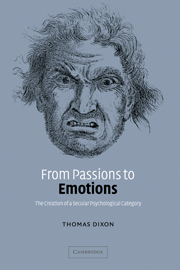Book contents
- Frontmatter
- Contents
- Acknowledgments
- Note on quotations
- 1 Introduction: from passions and affections to emotions
- 2 Passions and affections in Augustine and Aquinas
- 3 From movements to mechanisms: passions, sentiments and affections in the Age of Reason
- 4 The Scottish creation of ‘the emotions’: David Hume, Thomas Brown, Thomas Chalmers
- 5 The physicalist appropriation of Brownian emotions: Alexander Bain, Herbert Spencer, Charles Darwin
- 6 Christian and theistic responses to the new physicalist emotions paradigm
- 7 What was an emotion in 1884? William James and his critics
- 8 Conclusions: how history can help us think about ‘the emotions’
- Bibliography
- Index
1 - Introduction: from passions and affections to emotions
Published online by Cambridge University Press: 22 September 2009
- Frontmatter
- Contents
- Acknowledgments
- Note on quotations
- 1 Introduction: from passions and affections to emotions
- 2 Passions and affections in Augustine and Aquinas
- 3 From movements to mechanisms: passions, sentiments and affections in the Age of Reason
- 4 The Scottish creation of ‘the emotions’: David Hume, Thomas Brown, Thomas Chalmers
- 5 The physicalist appropriation of Brownian emotions: Alexander Bain, Herbert Spencer, Charles Darwin
- 6 Christian and theistic responses to the new physicalist emotions paradigm
- 7 What was an emotion in 1884? William James and his critics
- 8 Conclusions: how history can help us think about ‘the emotions’
- Bibliography
- Index
Summary
The use of the word emotion in English psychology is comparatively modern. It is found in Hume, but even he speaks generally rather of passions or affections. When the word emotion did become current its application was very wide, covering all possible varieties of feeling, except those that are purely sensational in their origin.
James Mark Baldwin, Dictionary of Philosophy and Psychology (1905), I, 316How history can help us think about ‘the emotions’
Emotions are everywhere today. Increasing numbers of books and articles about the emotions are being produced; for both academic and broader audiences; by neuroscientists, psychologists and philosophers. As the author of one recent book on the science of the emotions puts it: ‘Emotion is now a hot topic.’ According to another, the last three decades have witnessed an explosion in emotion studies, in the fields of cognitive psychology, anthropology and literary history, which constitutes a veritable ‘revolution’. Recent academic work in a range of fields has celebrated the body and the emotions, in a reaction against the alleged preoccupation with intellect and reason to be found in earlier studies. There is now even such a thing as ‘Emotional Intelligence’, or ‘EQ’, analogous to IQ. Being in touch with one's emotions is, for many, an unquestioned good. The existence and the great value of the emotions is obvious to academics and non-academics alike. It is surprising, then, to discover that the emotions did not exist until just under two hundred years ago.
- Type
- Chapter
- Information
- From Passions to EmotionsThe Creation of a Secular Psychological Category, pp. 1 - 25Publisher: Cambridge University PressPrint publication year: 2003
- 1
- Cited by



